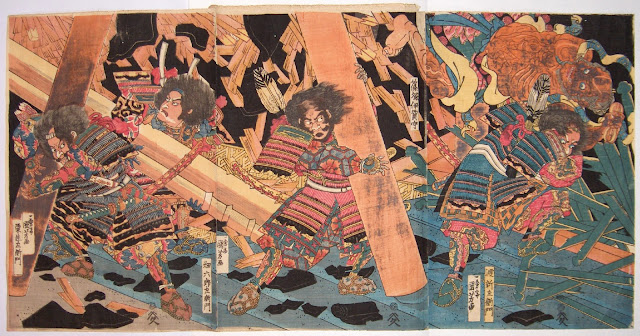Martial 'style' is a handicap
I've mentioned this before, but it came to my attention again when I heard an interesting allegory; martial 'style' is a handicap.
 In Chess, when playing against a weaker player, one side can choose to take a handicap by reducing the number of pieces they have access too. This is analogous to tying one hand behind the back in martial arts terms. Having less pieces makes it much more difficult to win, but an accomplished Chess player can still pull out a victory.
In Chess, when playing against a weaker player, one side can choose to take a handicap by reducing the number of pieces they have access too. This is analogous to tying one hand behind the back in martial arts terms. Having less pieces makes it much more difficult to win, but an accomplished Chess player can still pull out a victory.
In martial arts, 'style' has become a brand. In some cases for good reason. Judo and Tae Kwon Do for instance are Olympic sports and have a set list of rules and guidelines for competition that everyone follows to keep things fair. In other cases like Karate or Wing Chun, 'style' is only maintained to ensure the integrity of the brand. If Karate suddenly started adding weapons it wouldn't be Karate (空手 - empty hand) anymore.
The issue with maintaining a style for the sake of branding is that it leaves less Chess pieces on the board. If the pieces on the Chess board represented mobility (pawns), striking (bishops), throwing (knights), locking (castles) and weapons (Queen), a Karate Chess player would only start the game with half his pawns, a bishop and a king. This player would be handicapped against any other martial Chess player who brings all the pieces to the board.
Having a wide variety of knowledge and skills doesn't weaken a martial artist, it makes them stronger. A Judoka with the best throws in the world will still lose if he gets hammered by strikes before he can engage. A Karateka who has spent 20 years conditioning his body will still be unable to stop a knife. There are plenty examples of very strong martial artists being killed by untrained people, because they didn't have the tools to deal with the situation.
Martial sports practitioners often like to present their ring or competitive accomplishments as evidence of the effectiveness of their style, but reality doesn't happen in a ring with rules. Training a narrow skillset and mindset will result in poor outcomes when a situation turns bad.
All that being said, a martial artist with a wide skillset shouldn't become overconfident either, for as much time they put into training, there will always be another way to exploit and take advantage.
Martial artists shouldn't be hemmed in by 'style' or martial dogma. It only weakens their combat effectiveness. A martial artist should grab any tool they can find, because survival isn't about style, it's about getting home at the end of the day.
 In Chess, when playing against a weaker player, one side can choose to take a handicap by reducing the number of pieces they have access too. This is analogous to tying one hand behind the back in martial arts terms. Having less pieces makes it much more difficult to win, but an accomplished Chess player can still pull out a victory.
In Chess, when playing against a weaker player, one side can choose to take a handicap by reducing the number of pieces they have access too. This is analogous to tying one hand behind the back in martial arts terms. Having less pieces makes it much more difficult to win, but an accomplished Chess player can still pull out a victory. In martial arts, 'style' has become a brand. In some cases for good reason. Judo and Tae Kwon Do for instance are Olympic sports and have a set list of rules and guidelines for competition that everyone follows to keep things fair. In other cases like Karate or Wing Chun, 'style' is only maintained to ensure the integrity of the brand. If Karate suddenly started adding weapons it wouldn't be Karate (空手 - empty hand) anymore.
The issue with maintaining a style for the sake of branding is that it leaves less Chess pieces on the board. If the pieces on the Chess board represented mobility (pawns), striking (bishops), throwing (knights), locking (castles) and weapons (Queen), a Karate Chess player would only start the game with half his pawns, a bishop and a king. This player would be handicapped against any other martial Chess player who brings all the pieces to the board.
Having a wide variety of knowledge and skills doesn't weaken a martial artist, it makes them stronger. A Judoka with the best throws in the world will still lose if he gets hammered by strikes before he can engage. A Karateka who has spent 20 years conditioning his body will still be unable to stop a knife. There are plenty examples of very strong martial artists being killed by untrained people, because they didn't have the tools to deal with the situation.
Martial sports practitioners often like to present their ring or competitive accomplishments as evidence of the effectiveness of their style, but reality doesn't happen in a ring with rules. Training a narrow skillset and mindset will result in poor outcomes when a situation turns bad.
All that being said, a martial artist with a wide skillset shouldn't become overconfident either, for as much time they put into training, there will always be another way to exploit and take advantage.
Martial artists shouldn't be hemmed in by 'style' or martial dogma. It only weakens their combat effectiveness. A martial artist should grab any tool they can find, because survival isn't about style, it's about getting home at the end of the day.

